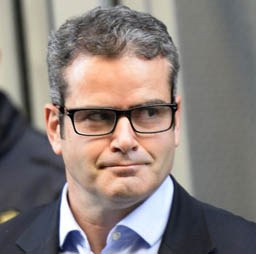Bruno Mitchell Iksil, nicknamed "The London Whale"
It is no secret that there are an order of magnitude more traders who have failed to achieve success in the financial markets than those who have managed to break through to the top of the financial Olympus and earn millions of dollars.
However, sometimes even gurus traders with many years of trading experience sometimes make fatal mistakes, the cost of which sometimes amounts to millions, and in some cases billions of dollars.
Many of these traders go to court and go through media and public purgatory for imagining themselves to be the kings of the market.
However, there are cases when a similar situation occurred under the strict guidance of management, and the trader who did the dirty work becomes the scapegoat.
The early years of the London Whale
Bruno Mitchell Iksil lived in a suburb of Paris from childhood in a fairly wealthy middle-class family. His mother was a chemist working in production, and his father worked as the director of a company selling auto parts.
Since childhood, Bruno Mitchell showed great interest in mathematics and physics and had good Olympiad achievements in these areas, not to mention the fact that he played chess professionally.
It is also worth noting that the “London Whale” was a true polyglot, and it took him no more than three months to learn a new language.
Excellent knowledge in physics and mathematics, as well as being among the top 150 best students in Paris based on exam results, allowed him to enter the Ecole Centrale Paris, where he, in turn, began to actively study and participate in nuclear technology projects.
After graduating from university in 1992, he became a civil servant at one of the nuclear facilities near Paris, where he was actively involved in design for the disposal and treatment of nuclear waste.
Trader career
Despite the fact that Bruno Mitchell Iksil was an excellent specialist in nuclear chemistry, the labor market dictated its conditions, so, on the advice of his labor agent, he had to look at the banking and financial sector.
His first place of work was the Transact Control fund, where he, in turn, held a senior position in the IT department and was also involved in hedging the company’s risks.
The Transact Control Foundation was founded by the Rothschild family, so obtaining a leadership position in this company was a huge springboard in the future career of the London whale.
A little later, namely in 1997, he received an offer from the French bank Natexis. At the French bank, Bruno Mitchell Iksil was actively involved in bond trading and also formed his investment portfolio.
However, for unknown reasons, Bruno was removed from management and deprived of his stake in the company.
Not agreeing and putting up with the injustice, Bruno filed a lawsuit against the company and successfully stole it, which allowed him to return to the company and head a new division, despite the infighting between the shareholders.
The collapse of hopes.
In 2005, Bruno Mitchell Iksil received an offer to head a division at JP Morgan, where he supervised two traders. Naturally, Bruno could not pass up the chance to work at the largest investment bank in Europe.
His task was not to make money for the company, as other traders did, but to hedge the risks of an existing investment portfolio.
Having coordinated all actions with management, the bank and Bruno actively began buying credit default swaps for 125 companies, which led to strong jumps in the market.
As Bruno Mitchell Iksil himself claims, he has repeatedly repeated that the injection of $8 billion simply cannot go unnoticed by other market participants.
At that time, no one knew who actually carried out such large-scale operations on the market, so the trader was nicknamed the London whale.
Everything would have worked out well, but information leaked into the public domain that the largest investment bank was playing against the market, so many funds from all over the world began to actively play against the company, which led to a market collapse and, as a result, a loss of $6 billion.
Despite the fact that society and the media, as well as the JP Morgan company itself, blamed all the dogs on the London whale, the court still fined the company for hiding data in the reporting, and Bruno Mitchell Iksil himself got away with only dismissal.
However, despite the general guilt of Bruno and the entire management, the path to the financial markets for the London whale became forever closed due to severe reputational losses
